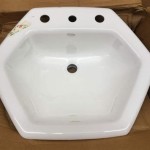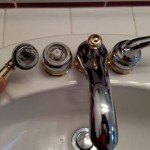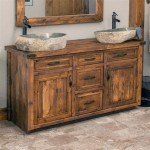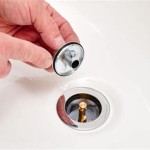Why Is There a Damp Smell in My Bathroom Sinks?
A damp smell emanating from bathroom sinks can be a persistent and unpleasant issue. Understanding the causes of this odor can help homeowners effectively address the problem. This article will delve into the most common reasons why bathroom sinks develop a damp smell, providing practical advice on how to identify and eliminate the source.Causes of a Damp Smell
A damp smell in bathroom sinks can arise from various sources, including:
1. Trapped Water and Moisture:
The most prevalent cause is trapped water and moisture within the sink's plumbing system. Drain traps, designed to prevent sewer gases from entering the house, can accumulate standing water over time. This stagnant water provides a breeding ground for bacteria and mold, producing a musty odor.
2. Clogged Drains:
Clogged drains can restrict water flow, leading to the formation of a damp environment. Hair, soap scum, and other debris can build up in the drainpipe, creating a perfect environment for bacteria and mold growth. The resulting decomposition releases foul odors.
3. Leaky Pipes:
Leaking pipes, even small ones, can contribute significantly to a damp smell. Water leaks from the faucet, pipes, or drain can create dampness under the sink or within enclosed spaces, promoting mold growth and unpleasant odors.
4. Inadequate Ventilation:
Poor ventilation allows moisture to linger in the bathroom, leading to a damp smell. Without proper airflow, condensation can form on surfaces, creating a breeding ground for bacteria and mold.
5. Mold and Mildew:
The presence of mold and mildew, especially in damp areas, is a primary source of a damp smell. These organisms thrive in moist environments and produce spores that can trigger allergies and respiratory issues.
Identifying the Source of the Odor
Once the possible causes for a damp smell are understood, the next step is to pinpoint the specific source. Several methods can be employed:
1. Visual Inspection:
A thorough visual inspection of the sink, drain, and surrounding areas can reveal visible signs of water leaks, mold growth, or clogs. Check for water droplets, discoloration, or signs of rust.
2. Drain Test:
Pour a significant amount of water down the drain and observe the flow. If the water drains slowly or backs up, it indicates a potential clog. Listen for gurgling noises, which can signal a blockage in the drainpipe.
3. Smell Test:
Sniff around the sink, drain, and under the cabinet to identify the precise location of the damp smell. This can help you determine if the odor is originating from the drain, pipes, or a trapped area.
4. Moisture Meter:
A moisture meter can be used to measure the moisture levels in the surrounding area, helping to pinpoint the source of the dampness. This tool is particularly useful for detecting leaks that are not readily visible.
Eliminating the Damp Smell
Once the source of the damp smell is identified, the next step is to eliminate it. The solutions will vary depending on the specific cause:
1. Cleaning the Drain:
Regularly cleaning the drain with a drain cleaner or a combination of baking soda and vinegar can remove accumulated debris and prevent clogs. Use a plunger or drain snake to clear stubborn blockages.
2. Repairing Leaks:
Leaky faucets, pipes, or drains should be repaired promptly by a qualified plumber. Addressing leaks will prevent further moisture buildup and eliminate the source of the odor.
3. Improving Ventilation:
Ensure adequate ventilation in the bathroom by using an exhaust fan during and after showers. Open windows to allow fresh air circulation, particularly after cleaning or wet activities.
4. Mold Removal:
If mold is present, it should be removed promptly. Use a mixture of bleach and water or a mold-killing product to clean affected areas. Consult a professional mold remediation specialist for extensive mold infestations.
5. Preventative Measures:
To prevent future damp smells, consider these preventative measures: - Use a strainer to catch hair and debris before they enter the drain. - Flush the drain with hot water after each use to prevent clogs. - Avoid pouring grease or oil down the drain. - Regularly inspect pipes for signs of leaks. - Keep the bathroom well-ventilated.

Why Does My Bathroom Sink Stink Plumbing Authority Inc

Moldy Smelling Water From Bathroom Faucet Hometalk

Bathroom Smells Like Sewage Causes Fixes Inside Out

What To Do When The Bathroom Sink Smells Like Mildew

Why Is There A Stagnant Smell In The Bathroom
My Bathroom Smells Bad But Only When Its Hot Outside It Also Will Slightly Go Away I Run The Sink And Toilet Bathtub Any Thoughts On What Is

Musty Smells In The Bathroom Clever Ideas For Odor Removal
Why Does My Bathroom Sink Smell When I Run Water Quora

Why Is There A Stagnant Smell In The Bathroom

How To Prevent Find Get Rid Of Mold In Your Bathroom







